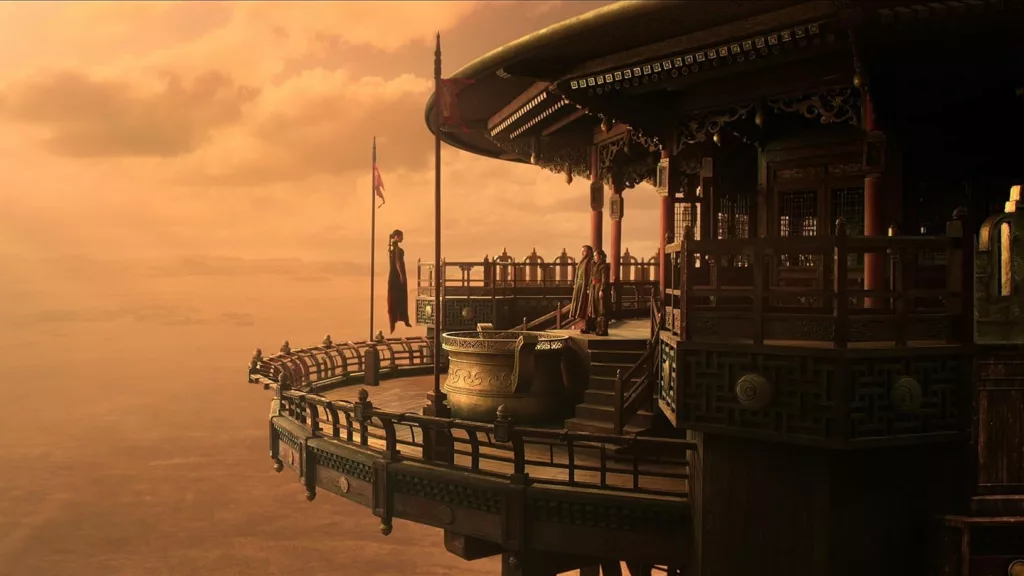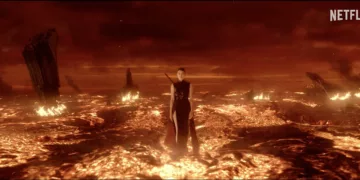In the vast expanse of the literary cosmos, few sci-fi epics have burned as brilliantly as Cixin Liu’s “Remembrance of Earth’s Past” trilogy. A staggering, generation-spanning saga of humanity’s first contact with extraterrestrial forces, the Hugo Award-winning book series captivated readers worldwide with its audacious concepts and profound existential scope. So when streaming juggernaut Netflix announced its intent to adapt this dense, quasi-philosophical work, expectations immediately stratospherics.
Naturally, much rested on the visionary talents entrusted with this interstellar endeavor. Showrunners David Benioff and D.B. Weiss, fresh from their volcanic stint as Game of Thrones’ supreme architects, joined forces with Alexander Woo of The Terror renown.
A creative coalition forged from premium TV’s most admired realms – one could scarcely envision a more formidable vanguard to wrestle Liu’s lofty tapestry into the bingeable format. Yet even such pedigreed starcraft could not guarantee a seamless transition into the dizzying world of multidimensional upheaval and intergalactic brinkmanship awaiting them.
Fate Entwined Across Space and Time
At its celestial core, 3 Body Problem tracks the inexorable convergence of two parallel threads whose cosmic collision propels our planet to the precipice of oblivion. In 1960s China, the brilliant astrophysicist Ye Wenjie witnesses a harrowing injustice that shatters her faith in humanity, setting her on a clandestine path to make contact with a mysterious alien civilization.
Decades later, a string of disturbing scientist suicides catches the hawkish gaze of an investigator known only as Da Shi. His probe leads him to a group of former Oxford classmates – Jin, Saul, Auggie, Jack, and Will – each uniquely gifted yet struggling with insecurities and ennui in their thorny adult lives. This quintet’s interwoven journeys gradually reveal their place in an apocalyptic web spanning light years.
Strange occurrences escalate as Auggie perceives an ominous celestial countdown, while Jin and Jack become entranced by an enigmatic virtual reality simulation posing existential conundrums. What truths lurk behind these cosmic coincidences? The answers slipstream between the past and present, bridging elaborate set pieces like the tumult of the Cultural Revolution to sleek modern locales aided by top-shelf production value.
Showrunners Benioff, Weiss, and Woo deftly merge and recontextualize key narrative threads from Liu’s trilogy into a propulsive astronomical mystery. Characters are remixed into a multinational ensemble allowing diverse perspectives to coalesce. Theoretical astrophysics jargon whipsaws with breakneck momentum between emotional human arcs of ambition, love, and sacrifice in this daring pan-generational epic.
Boundless Ambition Meets Visionary Craft
From its irrepressibly audacious premise alone, 3 Body Problem boldly demarcates its territory as a story unbound by conventional constraints. This odyssey through the existential unknown demands cosmic-level ambition, and the creative team behind Netflix’s prestige adaptation rises to that stellar challenge.
Parallel storylines careen across the sweep of Chinese history as well as hypothetical dimensions of mind and reality itself. Yet rather than become ensnared in its own labyrinthine complexities, the series maintains a propulsive trajectory by grounding the proceedings in universal emotional anchors. Even as the stakes exponentially engulf interplanetary civilizations across space-time, the motivations remain intensely personal for an ensemble navigating relatable insecurities around professional ennui, strained friendships, and unresolved heartbreak.
Such grand yet intimate tonal counterpoints are rendered tangible through meticulous world-building that melds lavish period recreations with sleek futurism. The fraught political turmoil of Maoist China is meticulously textured, from the grim tenement life of Ye’s early scenes to the austerity of the remote military facility where her fateful celestial communion takes root. These haunted backdrops merely presage the hallucinatory realms of alien virtuality that ecstatically embrace their science fantasy roots.
Tentpole set pieces thrust the viewer into vividly rendered cyberspace plains where uncanny physics warp the very rules of time and existence. The effects team deftly captures the intangible, from the eerie gravitational dances of cosmic bodies to the unsettlingly incorporeal dimensions where societies flatten into dehydrated husks awaiting cosmic rebirth.
Anchoring these transporting visual coups is an ensemble stocked with sterling talent equally adept at relaying human vulnerability and cosmic resilience. British-Chinese actress Jess Hong is the luminous core of the piece, projecting ethereal intellect and haunted empathy as Jin Cheng, our entry into the deepening cosmological mysteries. As her dogged pursuer, Benedict Wong deploys his innate watchability to imbue the brusque yet sympathetic Da Shi with salt-of-the-earth nobility in his pursuit of the truth.
Acclaimed Shakespearean veteran John Lithgow summons galactic gravitas as the enigmatic anomaly dubbed “Alien Dude” whose inscrutable agenda upends civilization as we comprehend it. Meanwhile, diverse ensemble figures like Eiza Gonzalez’s vulnerability-masked-as-apathy Auggie Salazar and Jovan Adepo’s engagingly cynical Saul lend complexions of idiosyncratic authenticity to this mosaic of human perseverance.
With soaring production values matched by emotional urgency and thematic heft, 3 Body Problem heeds the cosmic rallying cry for small-screen grandeur on the most grand and intimate scales imaginable.
Narrative Drift in the Void
For all its cosmic grandeur and conceptual daring, 3 Body Problem is not without atmospheric turbulence that occasionally sends its narrative payload spiraling off course. Even the most finely calibrated creative engine would struggle to maintain consistent propulsion across such a staggeringly vast interstellar expanse.
The series’ most persistent drag occurs whenever it pumps airbrakes to prioritize mainstream accessibility over fidelity to its dense source material. Exhilarating sequences of alien virtuality and hyper-speculative theory must cede staging to more pedestrian plot detours catering to the uninitiated. However noble the intent to onboard a wider viewership, these diversions into television conventionality disrupt the hard sci-fi aesthetic’s singularly unsettling rhythm.
Pacing lulls arise from both simple decompression between explosive set pieces and effort expended hand-holding the layperson through prerequisites for comprehending the heady cosmic concepts to come. Entire sequences of superfluous romantic angst sap momentum as characters contemplate crushes and insecurities paling alongside the existential threat of planetary extinction.
Such narrative wheel-spinning is symptomatic of a larger issue afflicting major characters, who for all their scientific prowess, remain thinly established as genuine personalities. Despite tantalizing shades of idiosyncrasy, pivotal figures like the haunted genius Jin and her brooding admirer Will fade into indistinct periphery, offloading narrative heavy-lifting to more archetypal poles of the ensemble.
Similarly underexplored is the emotional core surrounding Ye Wenjie’s radicalization, a tragic crucible that should have gripped viewers with searing human resonance. Yet her despairing motivations and controversial allegiance shift are rendered with a detached clinical distance, their deeper philosophical and ideological dimensions seldom plumbed.
This tendency for the series to sacrifice intimate nuance for operatic bombast also affects its portrayal of sociopolitical contexts like China’s Cultural Revolution upheaval. What should have manifested as textured recreations of a wrenching societal schism are too often rendered as stale institutional villain posturing.
While 3 Body Problem undeniably revels in its cosmic ambitions, its palpable struggle to adroitly juggle the intricate human elements and hot-button subtexts integral to Liu’s sweeping epic prove as daunting as the theoretical physics it strives to elucidate. For all its interstellar razzle-dazzle, the soul of this universe-spanning saga can drift intermittently out of viewers’ grasp.
Remapping an Interstellar Expanse
In the daunting task of translating Cixin Liu’s richly cerebral yet expansively scaled “Remembrance of Earth’s Past” trilogy to television, the showrunners wisely embraced an adaptive ethos of pragmatic reinvention rather than rigid fidelity. For all its lofty conceptual ambitions, the source material’s sheer immensity and digressions into theoretical physics lectures ultimately proved ill-suited to be simply transposed verbatim to the small screen.
Through an alchemical remix of storylines, characters, and locales threaded across Liu’s byzantine narrative tapestry, Benioff, Weiss, and Woo distilled the essence into a more cohesive serialized construct streamlined for mainstream accessibility. Entire swaths of the novels’ most abstruse scientific and philosophical discourse were judiciously pared back or repurposed as evocative visual and auditory motifs rather than literal exegesis.
Such calculated recontextualizing engendered the most glaring alterations, including relocating the main action from Beijing to London and transforming protagonists into a cosmopolitan ensemble whose colliding arcs coalesced around emotional anchors of professional ambition, interpersonal bonds, and psychological turmoil rather than arid mathematical dissertation. While potentially grating for purists, these revisions facilitated far richer themes around humanity’s fraught existential anxieties in confronting the implacable cosmos.
Not all changes landed as gracefully. By condensing and remixing narrative threads, characterizations occasionally lapsed into archetypal simplicity, flattening crucial psychological interiority. And despite admirable verisimilitude in recreating China’s volatile 1960s sociopolitical landscape, ample opportunities to excavate Liu’s more searing critiques of totalitarian ideology were largely squandered in favor of crowd-pleasing genre amalgams of conspiracies and extinction-level events.
Yet such creative triage may have proven a necessary compromise to respirate Liu’s cosmic emanations into vibrant existence for the discerning mainstream viewership it courted. As a dexterous remix elevating the profound from the inaccessibly arcane, Netflix’s celestial reworking illuminates new constellations of relevance and resonance.
Promise and Peril in the Cosmic Frontier
In undertaking the herculean task of rendering Cixin Liu’s esoteric yet acclaimed sci-fi saga for mass consumption, Netflix’s 3 Body Problem charts an erratic trajectory oscillating between visionary inspiration and uneven execution. For all its ingenious cosmic world-building and conceptual derring-do traversing the most rarefied realms of speculative theoretics, the series succumbs to occasional storytelling drift and compromises engendered by catering to mainstream accessibility.
The adaptation’s loftiest ambitions are undeniably realized in sequences of eye-widening visual grandeur and cerebral provocation that thrust viewers into unsettling realms where the physics governing our universe must be reconceived from first principles. In transporting us to cyberspaces simulating civilizations of haunting alien provenance all while grounding pivotal emotional arcs in resonant human travails, 3 Body Problem heralds television’s ascendance as a medium capable of rendering science fiction’s wildest emanations tangible.
Yet such cosmic epiphanies are occluded at inopportune junctures when conventional scripting instincts override the source material’s core strangeness and ideological grit. Too often, episodes stray into overly literal romantic subplots or underwhelming action detours that stifle the tale’s singular unsettling rhythm while skirting its most incisive sociopolitical commentaries and blunting crucial character shadings.
For the discerning sci-fi connoisseur immersed in Liu’s universe, such course corrections may induce conceptual whiplash and nostril-flaring agita over self-censoring compromises. But for the substantial mainstream viewership 3 Body Problem covets, these calculated recalibrations may facilitate a tangible foothold into this otherwise unapologetically rarefied saga of looming extinction events and humanity’s existential anxieties when confronting the vast apathy of an indifferent cosmos.
Ultimately, the series’ virtues as a work of formidable imagination and grandly rendered interstellar spectacle outshine its intermittent lapses into more pedestrian conventions. Though fervent purists may lament alterations and elisions arising from condensing Liu’s baroque cosmological architecture into digestible mass entertainment, Benioff, Weiss, and Woo’s translation achieves a fusion of gravitas and bingeable allure elevating it to the vanguard of small-screen sci-fi.
Tantalizing hints of grander interstellar machinations await exploration in potential successive seasons. If the architects can harness the totality of their convictions while maintaining their stellar production acumen, 3 Body Problem could emerge as a galactic landmark – a cosmic destination transcending its lofty pedigree to become appointment viewing for all viewers yearning to confront humanity’s impermanence in the great celestial beyond.
The Review
3 Body Problem
An ambitious, visually dazzling sci-fi adaptation that translates the vast cosmic scale of Cixin Liu's revered book trilogy to the screen with a blend of awe-inspiring spectacle and emotional grounding. For all its pioneering ambition in rendering complex concepts tangible, uneven pacing and underdeveloped character work prevent it from reaching true transcendence. Still, it remains a must-see for sci-fi enthusiasts craving singular imaginative visions realized with technical mastery.
PROS
- Ambitious, grand scope and scale
- Stunning visual effects and world-building
- Effective adaptation of complex scientific concepts
- Strong performances, especially Jess Hong and Benedict Wong
- Tackles profound existential and philosophical themes
- High production values
CONS
- Uneven pacing and storytelling at times
- Some underdeveloped characters and relationships
- Sacrifices source material's nuances for mainstream accessibility
- Occasional lapses into conventional genre tropes
- Ideological/sociopolitical elements could be more incisive



























